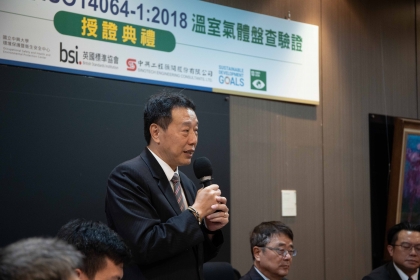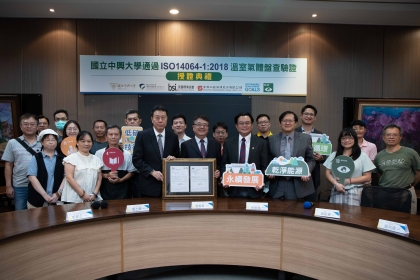Taking the First Step Towards a Net-Zero Emissions Campus by 2040 NCHU Awarded ISO 14064-1:2018 International Certification for Organizational Greenhouse Gas Inventory
2024-07-29
秘書室
Unit秘書室
1,593
Source: NCHU Occupational Safety & Health & Environmental Protection Center
In response to the United Nations Sustainable Development framework and the government's goal of achieving "Net-zero Emissions by 2050," National Chung Hsing University (NCHU) certified the international certification "ISO 14064-1: 2018 Organizational Greenhouse Gas Inventory and Verification" by the British Standards Institution (BSI) in May 2024. This certification establishes greenhouse gas calculation standards based on international guidelines, and the data verified by the certified unit must undergo rigorous auditing to achieve certification.
NCHU is acutely aware of the greenhouse effect's growing impact on global climate change. As part of its social and environmental responsibility, the university proactively implemented the greenhouse gas management system (ISO 14064: 2006) in 2011. On December 16, 2013, NCHU received the international verification for its greenhouse gas management from the British Standards Institution (BSI). becoming the second national university in Taiwan to receive this international certification at the time. Since then, NCHU has continued its campus carbon inventory work for ten years, autonomously conducting inventory operations and system setups to monitor campus greenhouse gas emissions, annually publishing the university greenhouse gas inventory report. Among the initially certified public and private universities, few continue this work today.
In September 2023, NCHU introduced the "ISO 14064-1: 2018 Organizational Greenhouse Gas Inventory" system, engaging a consulting firm for inventory operations based on the baseline year 2022. The inventory involved auditing 16 campus areas, including the main campus, four forest stations, and the Nantou branch. Teaching and administrative units received three training sessions and internal and external audits from the consulting firm. With the assistance of various units in executing the inventory operations, NCHU accurately tracked the greenhouse gas inventory data and emissions, promoting "greenhouse gas inventory" initiatives and supporting energy-saving and carbon-reduction actions to achieve substantial reduction goals.
According to the total greenhouse gas emissions statistics over the past decade, a series of carbon reduction measures significantly decreased emissions. These measures included upgrading to the high-efficiency equipment (such as air conditioning systems), replacing lighting with LED fixtures, installing smart meters, and developing a smart microgrid, reducing NCHU’s indirect carbon dioxide emissions from electricity by 44.37%. These efforts cumulatively decreased carbon dioxide equivalent emissions by 15,665.120 metric tons, achieving the goal of lowering the university's greenhouse gas emissions and enhancing energy efficiency, thereby creating a healthy learning and living environment for future generations.
Now NCHU integrates the four net-zero emissions pillars of "carbon reduction," "carbon sequestration," "circular utilization," and "green tendency" with "negative carbon agriculture" and "net-zero engineering." Since 2021, the university has actively collaborated with government and industry to incorporate renewable energy (such as solar, hydrogen, and biomass), carbon capture technologies, AIoT monitoring, and smart grid systems. In addition, on January 26, 2022, NCHU established the nation's first " Office of Industrial Carbon Offset Promotions " among universities to assist industries in achieving net-zero transitions. Currently, NCHU is developing a virtual power plant demonstration site at the Animal Experiment Farm, aiming for carbon neutrality by 2025. Concurrently, the university is advancing towards a net-zero carbon campus by 2040, aspiring to become the leading sustainable university in central Taiwan and a pioneer in net-zero development.
In response to the United Nations Sustainable Development framework and the government's goal of achieving "Net-zero Emissions by 2050," National Chung Hsing University (NCHU) certified the international certification "ISO 14064-1: 2018 Organizational Greenhouse Gas Inventory and Verification" by the British Standards Institution (BSI) in May 2024. This certification establishes greenhouse gas calculation standards based on international guidelines, and the data verified by the certified unit must undergo rigorous auditing to achieve certification.
NCHU is acutely aware of the greenhouse effect's growing impact on global climate change. As part of its social and environmental responsibility, the university proactively implemented the greenhouse gas management system (ISO 14064: 2006) in 2011. On December 16, 2013, NCHU received the international verification for its greenhouse gas management from the British Standards Institution (BSI). becoming the second national university in Taiwan to receive this international certification at the time. Since then, NCHU has continued its campus carbon inventory work for ten years, autonomously conducting inventory operations and system setups to monitor campus greenhouse gas emissions, annually publishing the university greenhouse gas inventory report. Among the initially certified public and private universities, few continue this work today.
In September 2023, NCHU introduced the "ISO 14064-1: 2018 Organizational Greenhouse Gas Inventory" system, engaging a consulting firm for inventory operations based on the baseline year 2022. The inventory involved auditing 16 campus areas, including the main campus, four forest stations, and the Nantou branch. Teaching and administrative units received three training sessions and internal and external audits from the consulting firm. With the assistance of various units in executing the inventory operations, NCHU accurately tracked the greenhouse gas inventory data and emissions, promoting "greenhouse gas inventory" initiatives and supporting energy-saving and carbon-reduction actions to achieve substantial reduction goals.
According to the total greenhouse gas emissions statistics over the past decade, a series of carbon reduction measures significantly decreased emissions. These measures included upgrading to the high-efficiency equipment (such as air conditioning systems), replacing lighting with LED fixtures, installing smart meters, and developing a smart microgrid, reducing NCHU’s indirect carbon dioxide emissions from electricity by 44.37%. These efforts cumulatively decreased carbon dioxide equivalent emissions by 15,665.120 metric tons, achieving the goal of lowering the university's greenhouse gas emissions and enhancing energy efficiency, thereby creating a healthy learning and living environment for future generations.
Now NCHU integrates the four net-zero emissions pillars of "carbon reduction," "carbon sequestration," "circular utilization," and "green tendency" with "negative carbon agriculture" and "net-zero engineering." Since 2021, the university has actively collaborated with government and industry to incorporate renewable energy (such as solar, hydrogen, and biomass), carbon capture technologies, AIoT monitoring, and smart grid systems. In addition, on January 26, 2022, NCHU established the nation's first " Office of Industrial Carbon Offset Promotions " among universities to assist industries in achieving net-zero transitions. Currently, NCHU is developing a virtual power plant demonstration site at the Animal Experiment Farm, aiming for carbon neutrality by 2025. Concurrently, the university is advancing towards a net-zero carbon campus by 2040, aspiring to become the leading sustainable university in central Taiwan and a pioneer in net-zero development.



